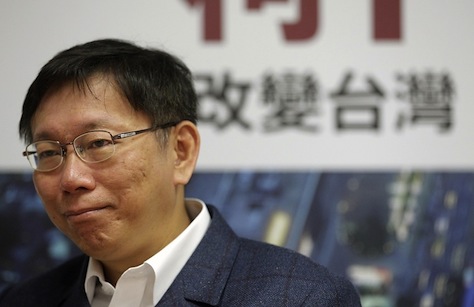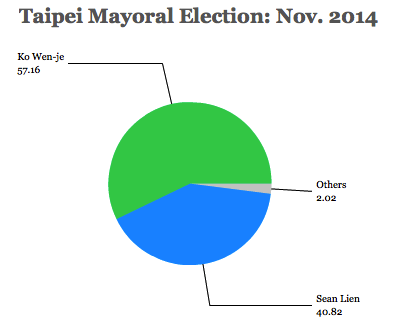Forget Japan’s election in two weeks — the political earthquake in east Asia today come in the form of a new pro-independence mayor in Taipei, the capital city of Taiwan, also known as the Republic of China (ROC).![]()
![]()
The result is a stinging defeat for the ruling Kuomintang (中國國民黨), and prime minister Jiang Yi-huah stepped down in response to the Kuomintang’s defeats in municipal elections held Saturday across the island of Taiwan. The scale of the ruling party’s defeat in the November 29 elections indicates that it will be hard-pressed to hold onto Taiwan’s presidency in 2016, paving the way for a more stridently pro-independence president.
Following the local elections, the Kuomintang lost power in eight of the country’s 22 various city and county governments.
In Taipei, Dr. Ko Wen-je, a respected surgeon and an independent candidate supported by the opposition, pro-independence Democratic Progressive Party (DPP, 民主進步黨), easily won the capital’s mayoral election, ending 16 years of Kuomintang control.
Ko defeated Sean Lien, a financier, and, as the son of a former vice president, a scion of the Kuomintang elite. Lien was never the strongest candidate for Taipei’s mayoral election, and Ko headed the trauma hospital unit that saved Lien’s life four years ago. A surgeon team supervised by Ko successfully removed a bullet from Lien’s head after he was shot at a 2010 campaign rally.
While Lien promised to bring international capital (including, presumably, from Beijing, Shanghai and elsewhere in the PRC) to Taipei, Ko focused on social justice in a country that faces growing income inequality and rising housing prices, familiar concerns across the developed world.
The elections were something of a referendum on the Kuomintang’s push to create closer economic ties with the Chinese mainland. So while the results are a setback for Kuomintang and Taiwan’s president Ma Ying-jeou (馬英九), they are even worse for the People’s Republic of China.
* * * * *
RELATED: Taiwan watches battle of wills
between Beijing and Hong Kong
* * * * *
Earlier this year, young Taiwanese students protested in full force to stop the Cross-Strait Service Trade Agreement (CSSTA), which would have significantly liberalized trade in services with mainland China. Ma’s attempt to push the agreement through the Taiwanese legislature met with furious opposition, and the CSSTA hasn’t yet been passed into law, a significant victory for the self-proclaimed ‘sunflower student movement.’
It’s a delicate time for cross-straits relations as China faces the vexing challenge of defusing pro-democracy protests in Hong Kong, which could easily climax in discord as the planned 2017 chief executive election approaches. Hong Kong, under the ‘one country, two systems’ principle, has much wider political and civil freedoms than mainland China, and it was promised free elections by 2017. Protestors, part of the ‘Occupy Central with Peace and Love’ movement, are demanding that Beijing allow an open election — and not just an election among pre-selected candidates deemed acceptable by the ruling Chinese Communist Party. (中国共产党). Even in Macao, a former Portuguese enclave and gaming industry haven that returned to Chinese rule in 1999, two years after Hong Kong, residents are demanding higher levels of democracy and accountability.
In the meanwhile, Taiwanese leaders and activists are watching all of this very carefully, because they believe greater economic ties with the PRC could gradually erode what’s left of Taiwanese sovereignty. Moreover, in an era of protests of umbrellas and sunflowers, Taiwanese politicians are being forced to reconfigure policy toward China on cultural and political as well as economic terms.
If relations between the central Chinese government and Hong Kong do not significantly improve, and if Taiwanese voters elect a pro-independence president in early 2016, it could trigger a new period of tension in cross-straits relations, forcing the attention not only of China’s neighbors, but possibly creating a headache for outgoing US president Barack Obama in an election year. A crisis between Beijing and Taipei could erase much of the hype the Obama administration has tried to generate over its much trumpeted ‘pivot’ to Asia. It’s one of the few global hotspots that could become a focus in the 2016 campaign, especially if, as widely expected, former secretary of state Hillary Rodham Clinton wins the Democratic Party’s nomination for the presidency.

